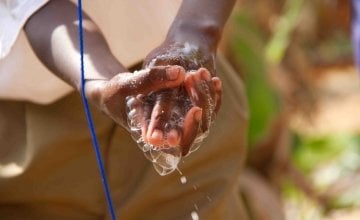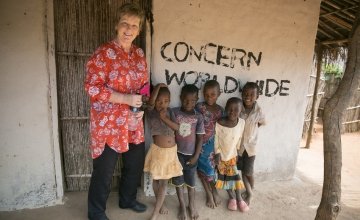
Read our 2023 annual report

Knowledge Hub
As the COVID-19 outbreak brings more and more countries to a standstill, there is mounting concern about the impact that the virus could have on vulnerable communities in Africa and Asia.
With many schools and businesses closed in Ireland, social distancing has become the norm, families are being kept apart and a general air of tension lingers.
More and more lives are being affected, both directly and indirectly, by the spread of COVID-19, a coronavirus that has travelled across the world with alarming speed since it was first detected in the Chinese city of Wuhan in late 2019.
While cases in Africa and parts of Asia have been relatively minimal at time of writing, Concern Worldwide’s International Programmes Director Anne O’Mahony is concerned about what is coming down the line.
"In most of the countries that we operate in, there are very weak health systems, very weak infrastructure, and the impact could be much greater,” she says.
“There's a huge worry that there won't be the capacity to deal with it."
A developing situation
The virus, in its earliest stages, generally causes fever, tiredness and a dry cough.
In 80% of cases, COVID-19 works its way through a person’s system without the need for specialist medical care. However, approximately one in every six people that get the virus will experience difficulty breathing and become seriously ill.
Older people, and those who have underlying health issues such as high blood pressure, heart problems or diabetes, are most at risk of serious illness and death from COVID-19.

Strong adherence to handwashing and hygiene protocols is a major weapon in fighting the spread of the disease but, in countries where access to clean water is a struggle for people on a daily basis, this is not always an option.
The promotion of safe hygiene is one of the cornerstones of Concern’s work, making the arrival of this pandemic particularly worrying.
The first case in sub-Saharan Africa was confirmed in Nigeria in late February, with the World Health Organisation warning of an “extremely rapid evolution” of the virus – which is now present in 34 of Africa’s 54 countries.
While numbers are low at present, they are rising all the time.
More than 3,900 Concern staff are on high alert in the most vulnerable countries in the world in preparation to deal with the impact of COVID-19 and Chief Executive Dominic MacSorley says that the humanitarian aid sector is under no illusions about the threat posed by the outbreak.
“If COVID-19 strikes at scale where we work in Africa, the Middle East, Asia and the Caribbean, millions of lives will be at risk.”
Across the world, governments are putting measures in place aimed at slowing the rate of progress of COVID-19.
These include increased testing, and guidance on self-isolation for those who have either tested positive themselves or come into close contact with someone else who has the virus, as well as the rapid dissolution of planned public gatherings and events.
It was announced yesterday that schools in Nigeria, sub-Saharan Africa’s biggest country with a population of over 20 million, are to close from Monday in an attempt to stifle the spread of the disease.
Death tolls rise
The death toll associated with the virus has been devastating, with more than 3,400 fatalities in Italy and 3,200 in China confirmed to date.
Given the impact of the disease on countries with strong health systems, this pandemic poses an even larger threat to densely populated countries who are already struggling with the impact of conflict, climate and malnutrition.
Anne believes that the number of cases in developing countries could be far higher than is currently being reported by the WHO, given the limited access to proper testing.
"There's limited access to testing, so the differential diagnosis between malaria, between flu, between your regular upper respiratory infections, and COVID-19, it's very difficult to get a full picture without consistent testing,” she says.
"The numbers of those infected may be much higher than indicated, but we don't know."
Planning a response
Concern has undertaken contingency planning in all of our countries of operation, and we are determined to carry on working for the world’s poorest people in the face of such difficult circumstances.
"The impact in most parts of Africa has not been huge as yet, but either there is under-reporting or we're just at the very beginning of the crisis there,” she explains.
“The effect of this on our global response in terms of flights, on access, on local government actions, in terms of movement of people is having an impact on our programmes."
Anne adds that while countries in Europe and the US are dealing with the local impact of the virus, a global response to support the most vulnerable is essential.
“It's understandable that we would want to manage it on our own doorstep first. However, there is a big world out there.”
Mounting pressure
How we act now will have a significant impact down the line, as countries face the uncertainty of massive economic upheaval. This is true of both European countries at the current epicentre of the outbreak, and those yet to experience the full force of COVID-19.
"We look at what's happening in Ireland, and we look at what's happening in Italy, and how the COVID virus has impacted on the health services of proportionately wealthy countries,” says Anne.
“Ireland is the third wealthiest country in the world, under the UN Human Development Index, and we are going to be stretched to the pin of our collar in managing it here."
This puts the potential impact on less wealthy countries into even greater perspective.

"There's ongoing conflict in so many different countries that causes the disruption in services in the first place. And these are still going on. The underlying causes of poverty are still there and now we are overlaying it with the COVID-19 virus and the ensuing economic downturn. Those two are a double whammy that are really going to affect Concern’s countries of operation."
Locust emergency
With COVID-19 dominating the worldwide news agenda, there is also the danger that other grave situations will be allowed to deteriorate without much-needed awareness – and ultimately, funds – being generated.
"Over the last few weeks, we've talked about the locust infestation in East Africa. That is still going on, but now it is going completely unnoticed because discussion around COVID-19 has taken over the agenda,” Anne explained.
"The locust infestation is still wreaking havoc with access to food throughout the Horn of Africa, and that will come back to impact on people's ability to recover from COVID-19.”
Anne warns that there are challenging times ahead for the countries where we work.
"I'm really worried about the next year, in terms of recovery, in terms of ability to cope, but also in terms of the rest of the world's focus on the countries that we work in. We can't operate without funds, without money, without the ability to get to these people.
"If that is going to be all turned northwards into our own countries, I think there is going to be a catastrophe."
Working together
The situation is challenging but Concern is ready to help. Our staff will draw on their expertise in water, sanitation and hygiene, community education, and healthcare worker training to mitigate the impact of Covid-19.
Concern has been fighting poverty and malnutrition, as well as the impact of diseases such as Ebola and cholera, for more than 50 years and will do everything in our power to help those affected by COVID-19 in our countries of operation.
Together, we can continue our mission to lift people out of extreme poverty, whatever it takes.





